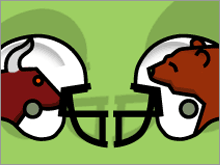|
Steelers' win good for stocks?
Super Bowl stock indicator more mirth and myth than reality, but it could be a bullish indicator this year.
NEW YORK (CNNMoney.com) - U.S. stocks might have had a very bad Friday, but they had a surprisingly good Sunday, as the National Football League playoffs produced a Super Bowl matchup that suggests a winning year for stocks is now a lock. When the Pittsburgh Steelers upset the Denver Broncos Sunday, it meant that neither team in the Feb. 5 game will have American Football League roots. The Steelers, which moved to the American Football Conference when the NFL and AFL merged in 1970, will face the Seattle Seahawks in this year's championship game.
And according to the Super Bowl Stock Indicator, a victory by an old NFL team means a bullish year for stocks, while a victory by an old AFL team gives the bears the upper hands. Of course, basing investment decisions on the outcome of the football game is as foolish as playing football without pads and a helmet. But the indicator has had a pretty good track record in predicting the direction of the Dow since the game started XL years ago. For example, the Dow posted gains after all four of the Steelers' Super Bowl wins in the 1970s, by an average of just less than 15 percent a year. And even after the 1996 loss by the Steelers, the Dow gained 20.6 percent, perhaps because the team lost to another NFL-born team, the Dallas Cowboys. Last season the AFL-born New England Patriots won their third Super Bowl in four years, and the Dow ended the year slightly lower, even though other major U.S. indexes posted a gain. The Dow also lost ground after the Pats' win in 2002. The indicator gets attention at this time every year due partly to the fact that there are so many football fans on Wall Street trading desks. Even Bob Stovall, who helped popularize the Super Bowl indicator in the 1970s when he served as investment policy director at Morgan Stanley predecessor Dean Witter Reynolds, admits there's not a lot of logic or validity behind it. He is now managing director and strategist at Wood Asset Management. "It's been correct just under 80 percent of the time -- I don't know of any other gaggle of gurus that has a record that good," said Stovall a year ago before the last Super Bowl. "Of course, I certainly wouldn't put real money into the market based on the game. But it's nice to know if it's on your side." But the indicator has had some trouble in recent years, after correctly predicting the market better than 90 percent of the time in the big game's first 31 years. The Dow posted a gain after the Pats' win over the Carolina Panthers in 2004, and the indicator's success after the Pats' wins in 2002 and 2004 are its only clean wins in the last eight games. In fact two of the market's best years followed wins by the AFL-born Denver Broncos over old NFL teams in 1998 and 1999. Assuming there's any validity to the indicator, part of the problem with it in recent years is that in four of the last six Super Bowls, one of the teams either was formed after the 1970 merger or changed its name in a post-merger relocation. The indicator didn't work in any of those four years. And that is the case again this year, as the Seattle Seahawks were formed in 1975. So a somewhat questionable indicator might be on shaky ground once again this season. For a look at some of the top ads on tap for this year's Super Bowl broadcast, click here.
For other news from the lighter side of the world of business, click here. |
|

